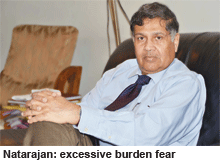An unofficial turf war waged covertly between the University Grants Commission (UGC, estb. 1953) which is mandated to supervise, regulate, fund and subsidise university education countrywide and the All India Council for Technical Education (AICTE, estb. 1987), has been decisively won by the former.
Following a Supreme Court verdict earlier this year which stripped AICTE of its powers to accredit, supervise and regulate technical education institutions affiliated with a university, on December 3 the UGC issued a draft of new regul-ations governing technical education giving universities/colleges and other stakeholders time till December 31 to make suggestions and amend-ments. This new set of regulations called the UGC (Approval of Colleges Offering Technical Educ-ation by Universities) Regulations, 2013, will come into force soon after this deadline elapses.
On April 25, in Association of Managements of Private Coll-eges vs. All India Council for Technical Education & Ors. (Civil Appeal No. 1145 of 2004) and Adaikalamath College Etc. vs. All India Council for Technical Education & Ors. (Civil Appeal Nos. 5736-5745 of 2004), the Supreme Court had clipped AICTE’s wings. The court ruled that technical colleges and institutes affiliated with universities are not “technical institutions” as defined under s.2 (h) of the AICTE Act, 1987 and as such fall outside the jurisdictional purview of AICTE and should be governed by parent universities and UGC under provisions of the UGC Act, 1956. The role of AICTE is of an advisor to UGC in matters relating to technical education, ruled the two judge bench of the apex court. A curative petition filed by AICTE was dismissed by the apex court on July 23.
 “It is held after analysing the provisions of ss.10, 11 and 12 of the AICTE Act that the role of inspection conferred upon AICTE vis-à-vis universities is limited to the purpose of ensuring proper maintenance of norms and standards in the technical education system so as to conform to the standards laid down by it with no further or direct control or scope for any direct action except to bring it to the notice of UGC,” ruled the court.
“It is held after analysing the provisions of ss.10, 11 and 12 of the AICTE Act that the role of inspection conferred upon AICTE vis-à-vis universities is limited to the purpose of ensuring proper maintenance of norms and standards in the technical education system so as to conform to the standards laid down by it with no further or direct control or scope for any direct action except to bring it to the notice of UGC,” ruled the court.
In effect the apex court divested AICTE of the wide power it has exercised over all colleges/institutes of technical education — including tech-nical institutions affiliated with univ-ersities — to inspect, accredit, recognise, regulate and derecognise them for not conforming with the accreditation norms and conditions laid down by the council. Henceforth AICTE can exercise these powers only in relation to stand-alone technical education institutes unaffiliated with a university. Conseq-uently the jurisdiction of AICTE which hitherto extended to over 11,800 institutes of technical education countrywide has been reduced to cover an estimated 1,000 independent technical education institutions.
The Supreme Court’s April 25 judge-ment has displeased the managements of most technical colleges as well as the Union HRD ministry who feel that UGC doesn’t have the expertise or band-width to supervise the country’s 8,562 ‘recognised’ technical education coll-eges/institutes. According to sources in Shastri Bhavan, Delhi (which houses the HRD ministry), Union HRD minister Dr. M.M. Pallam Raju voiced a proposal for a government ordinance to overrule the apex court’s judgement in the Union cabinet which didn’t find favour.
“Powers hitherto vested in AICTE for approving technical institutions, enhan-cing student intake, adding new courses etc are now transferred to UGC following the Supreme Court judge-ment. UGC which is already supervising and regulating 700 universities and thousands of colleges affiliated with them, has its plate full. One wonders how the cause of improving technical education will be served by transferring the duties and supervision of AICTE which has acquired some expertise over the past 25 years, to UGC,” comments Dr. R. Natarajan, former director of IIT-Madras and AICTE.
Self evidently, the Supreme Court’s judgement divesting AICTE of the regulatory powers it has hitherto exer-cised over technical education instit-utions for the past 26 years is based on a narrow interpretation of law. What its implications are for the urgently required upgradation and contemporisation of technical higher education quite obviously didn’t trouble the judicial conscience.
Autar Nehru (Delhi)